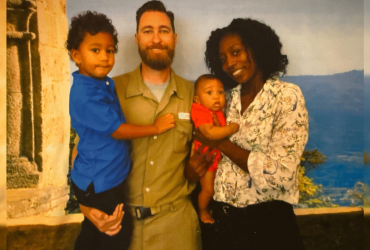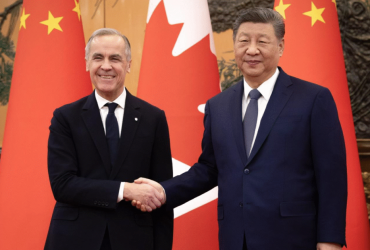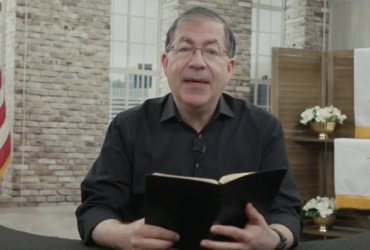The creeping transformation of Western cities under demographic and cultural pressures has long been a cautionary tale in Europe, particularly in the UK, where London—once a beacon of Enlightenment values (and more importantly biblical truths) — has earned the moniker “Londonistan” for its visible embrace of parallel Islamic societies. With 15% of its population now Muslim, the city features halal-dominated high streets and Friday prayer congregations that overwhelm urban traffic.
Across the Atlantic, Texas stands at a similar crossroads, its Muslim population surging amid rapid urbanization in hubs like Dallas and Houston. While Europe’s trajectory offers stark parallels—accelerated by lax policies and demographic shifts—Texas still holds unique tools, like robust state legislation, to diverge from this path. This article compares the two regions across key indicators, underscoring why the Lone Star State must heed Britain’s missteps to avoid a similar fate.
Demographics: The Slow-Motion Shift
Europe’s Muslim demographics have reshaped societies in ways once dismissed as alarmist. In the UK, the Muslim population expanded by 111% from 2001 to 2016, dwarfing the 10.7% growth in the native population. Muhammad has topped boys’ names in England for three years straight, while cities like Paris (15% Muslim) and Brussels (30%) reflect broader continental trends: France’s Muslim average age is 31, two decades younger than native Europeans. Officials framed this as benign immigration and fertility, but it has fostered “conquest by womb and visa,” eroding cultural cohesion.
Texas mirrors this acceleration. The state’s Muslim population has risen 25% in a decade to 350,000–400,000, with projections placing Islam as America’s second-largest faith by 2040. Prison conversions bolster this: 9–18% of inmates identify as Muslim, comprising 80% of all religious shifts behind bars. Europe’s dismissal of “demography is destiny” led to Londonistan; Texas risks the same if unchecked growth outpaces integration.
Mosques and Madrassas: Building Parallel Worlds
The proliferation of Islamic institutions has been a cornerstone of Europe’s parallel societies. Britain escalated from 13 registered mosques in 1963 to over 2,175 today, with 42% under the Deobandi sect—the ideological cradle of the Taliban. Attached madrassas deliver 17 hours weekly of Quran study, unregulated by bodies like OFSTED (Office for Standards in Education, Children’s Services and Skills), outpacing the superficial Sunday school programs in declining churches.
The UK has lost 6% of its state Anglican churches over the last 25 years, yet the number of Mosques has tripled! Britain is witnessing a rapid change in its religious fabric away from the established state Church. The one thing that Christianity and Islam share is that they are both missionary religions with a compulsion to share and spread their faith. But this is the only issue of commonality, as Islam seeks to denigrate and demolish the Truth of the deity of Jesus—the central issue on which Christianity is based. Islam is a direct attack on who Christ is.
In Texas, the pace is brisker: 47 new mosques in 24 months, including 224 in Dallas-Fort Worth and 109 in Houston. Fresh domes dot Irving’s Belt Line Road since 2023, alongside schools like Brighter Horizons Academy (1,700 students, bolstered by $2.1 million in federal funds) and the Islamic School of Irving, where young children prioritize Quran memorization over core curricula. Good Tree Academy, with 400 segregated pupils since 2024, exemplifies this rapid entrenchment. Europe’s fortresses of faith became breeding grounds for isolation; Texas’s versions, amplified by sprawling suburbs, could solidify faster.
Halal Economy: From Choice to Mandate
What began as niche markets in Europe has morphed into economic dominance. The UK’s supermarkets default to unlabeled halal meat. Schools, hospitals, and prisons responded to pressure from parents, patients, and prisoners. In schools, this happens without engagement with the parents. There are no consultations, and even Church of England schools embrace Halal food. The global halal industry, valued at $4.1 trillion and growing 11% annually, claims a $90 billion slice in Britain alone.
Texas has vaulted ahead: its halal sector has hit $9 billion, with 20% year-on-year growth in Dallas and Houston. Costco in Plano boasts expansive halal counters, while Alnoor Market thrives on Dallas ISD’s mandate for halal nuggets served to 150,000 students weekly—tax-funded, unlabeled, and opt-out free.
Britain’s “invisible tax” started identically; Texas’s scale, tied to agribusiness, amplifies the risk of normalized imposition.
Sharia Finance: Ethical Facade or Ideological Inroad?
London’s pivot under David Cameron in 2013 crowned it the West’s Sharia-banking hub, with five full banks and twenty more outlets. The $5.4 trillion global Islamic finance market, projected to reach $9.75 trillion by 2029, was rebranded as “ethical,” masking deeper capitulation.
Texas edges closer: Sharia-compliant mortgages proliferate in Dallas, with 15 U.S. institutions offering riba-free (interest-prohibited) products per Quran 2:275-279. This subtly elevates divine law over state norms, much as London’s “pinstripe surrender” influenced policy. Europe’s financial Trojan horse bought influence; Texas’s energy wealth could make it a larger prize.
Sharia Courts: Arbitration or Undermining Justice?
Eighty-five Sharia councils operate in the UK, state-sanctioned as “voluntary” arbitration but enforcing disparities like women’s one-eighth inheritance (Quran 4:11) and spousal “discipline” (4:34). Coercion has supplanted consent.
In Texas, HB 45 aimed to curb this, yet two tribunals persist in 2025: the Islamic Tribunal of Texas at 666 N. Main St., Irving, with an active docket, and Dar El-Eiman in Valley Ranch. Recent rulings mirror Quranic inequities, dismissed as “voluntary.” Britain’s pretense eroded legal uniformity; Texas’s holdouts signal vulnerability.
Grooming Gangs and Honor Violence: The Human Cost of Silence
Britain’s scandal—90 trials, 500 convictions across 40 towns over 6 decades—exposed up to a million girls abused by Muslim Pakistani networks over decades, with police suppressing evidence to avoid “racism” accusations. Sweden echoed this cover-up; the UK still withholds ethnicity and religious data in abuse cases.
Texas reports rising “honor-based violence,” met with emerging reticence. Without mandatory ethnicity and religious tracking—unlike Europe’s ongoing refusal—the pattern of fear-driven inaction could take root, amplifying unchecked predation.
Veiling and Scriptural Mandates: Isolation and Ideology
Quranic directives like 33:59 (veiling for “protection”) and 24:31 (restricted male viewers) have ghettoized women in Europe, confining them to non-English-speaking enclaves under effective house arrest. London’s niqab-clad isolation is commonplace. The “sword verses” (e.g., 9:5, 9:29) are contextualized by moderates but literalized by jihadists, tilting the narrative toward extremism.
Texas’s growing communities risk parallel seclusion, with veiling norms clashing against open societies. Europe’s “protection” prison stifles integration; the U.S.’s freedoms demand proactive safeguards.
The Battle Over EPIC City: A Mono-Religious Enclave and Its Shadow
At the heart of Texas’s current cultural flashpoint lies the contentious EPIC City project—a 402-acre master-planned development straddling Collin and Hunt Counties, spearheaded by the East Plano Islamic Center (EPIC). Envisioned as a self-contained community with over 1,000 homes, a K-12 faith-based Islamic school, a central mosque, assisted living facilities, apartments, and clinics, it promises a haven tailored to Muslim families.
But is it right to carve out a mono-religious city that, in practice, excludes all others? Proponents tout it as inclusive, yet its marketing to Muslim buyers—with the first 450 plots snapped up by the faithful—suggests a de facto enclave where Sharia influences could overshadow Texas law, echoing Europe’s failed experiments in segregated utopias.
The battle erupted in early 2025, igniting a firestorm of state and federal scrutiny. Texas Attorney General Ken Paxton has been a relentless force in this fight, uncovering evidence of illegal securities sales by EPIC-linked entities, accusing them of federal violations, and pursuing legal action as recently as October—exemplifying his steadfast commitment to protecting Texas values from opaque overreach. Governor Greg Abbott mobilized agencies like the Texas Funeral Service Commission for cease-and-desist orders and the Texas Commission on Environmental Quality to halt unpermitted construction, while five parallel investigations probed discrimination and governance concerns.
Adding federal firepower, U.S. Representative Chip Roy (TX-21) has amplified the grassroots resistance, publicly rallying Texans against the project via social media and statements, including highlighting packed city council meetings in Josephine where citizens voiced opposition to this Islamic megaproject—his vocal advocacy underscoring a broader congressional pushback against parallel societies.
U.S. Senator John Cornyn urged a DOJ civil rights probe in April, citing fears of religious exclusion and Sharia impositions that could infringe on non-Muslims’ rights—a probe that closed in June without findings of wrongdoing, though developers affirmed openness to all faiths. In response, Abbott signed HB 4211 in June, a targeted law curbing such private municipalities to safeguard fair housing and religious freedom—hailed by supporters as a bulwark against parallel societies.
Just four days ago, on November 10, the project rebranded to “The Meadow,” a move developers attribute to quelling “public confusion” over its status as a potential independent city rather than a standard subdivision. Critics see it as a semantic dodge to evade regulatory heat amid ongoing probes. The primary financier? The East Plano Islamic Center itself, through its for-profit arm, Community Capital Partners, which has crowdfunded via plot sales to Muslim investors—raising questions about opaque funding trails potentially laced with foreign influences, much like Qatar’s infusions elsewhere.
This is a profound concern: Britain’s allowance of insular enclaves bred isolation and extremism; Texas’s EPIC/The Meadow risks the same, normalizing mono-faith strongholds that undermine the pluralistic fabric Abbott’s laws aim to protect. With construction looming, HB 4211 remains the lone star’s sharpest sword—wield it before the meadows turn to fortresses.
The Money Trail: Foreign Funding Fuels Expansion
Qatar’s billions flow to U.S. universities and DHS grants via Muslim Brotherhood-linked entities like CAIR-Texas. Texas Republicans’ 2025 resolution to label the Brotherhood a terrorist group highlights traceability—a step Britain overlooked.
At the federal level, Rep. Chip Roy has led the charge with his introduction of the Muslim Brotherhood Is a Terrorist Organization Act of 2025 (H.R. 3883), alongside the No Tax-Exemptions for Terror Act, stripping extremist groups of their nonprofit shields and ensuring American taxpayers aren’t subsidizing threats—bold moves that complement Paxton’s state-level vigilance and fortify Texas’s defenses.
Lax Oversight: Harboring Banned Extremist Networks
A glaring divergence in the UK-Europe vs. U.S.-Texas comparison is regulatory leniency. British governments have historically permitted organizations banned elsewhere to flourish, including those with headquarters or major operations in London. This laxity stems from a reluctance to confront extremism under multiculturalism’s banner, allowing networks to embed deeply.
Prime among these is the Muslim Brotherhood (MB), founded in Egypt in 1928 as a Sunni Islamist movement promoting political Islam. Banned as a terrorist organization in over a dozen countries—including Egypt (2013), the UAE, Saudi Arabia, Bahrain, Russia, Austria (2021), and Jordan (2025)—the MB faces designations for fomenting violence and extremism.
Despite this, it operates freely in the UK, with affiliates like the Muslim Association of Britain maintaining influence and ties to sanctioned entities. London’s role as a hub amplifies this: MB-linked groups have faced Charity Commission probes for extremism and opaque funding, yet persist without proscription under the UK’s Terrorism Act.
The U.S. echoes this tolerance, with no federal terrorist designation despite bipartisan bills and congressional hearings decrying the MB’s “global threat” and radicalization risks. Reports from bodies like the George Washington University Program on Extremism highlight MB networks in both nations promoting supremacist ideologies, including non-violent pathways to Islamist governance that mask deeper militancy. Texas, with CAIR’s local chapter under scrutiny, must tighten scrutiny to avoid Europe’s harbor-for-outcasts model, where banned entities like the MB leverage free speech to erode it from within.
A Parting Warning: Texas Can Still Chart Its Own Course
Europe’s capitals, from London to Brussels, illustrate the perils of complacency: adhan drowning church bells, niqabs confronting casual freedoms, and “Islamophobia” edicts veiling criticism. Texas, however, wields HB 45, HB 4211, and the Second Amendment—plus Governors, AG’s, Senators and House Representatives unafraid of federal overreach. Time is short, but the Lone Star State’s spirit offers redemption where Europe’s waned. Heed Londonistan’s echo: diverge now, or join its shadow.
The post Is Texas About to Fall to Islam? Lessons from Londonistan for the Lone Star State appeared first on The Gateway Pundit.











